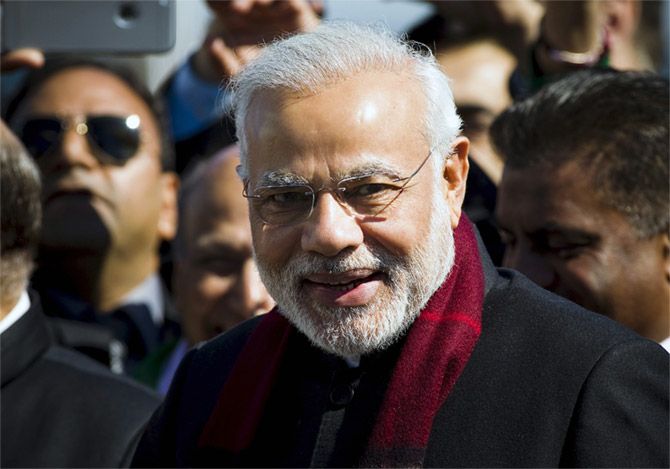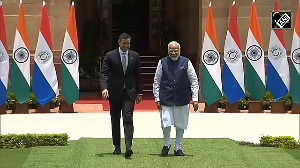'The avoidance of the 'P' word had less to do with reality and more to do with the politics -- domestic and international -- of Mr Modi and his efforts to both appear statesman-like (vis-a-vis Pakistan) and rid himself of the taint of being some kind of Muslim-baiting hardliner,' says Sushant Sareen.

One year into office, Prime Minister Narendra Modi has, in an interview to Time magazine, sketched out his thinking and approach on the issue of international terrorism.
Much of what the PM said was unexceptionable, if also somewhat utopian. Although there was no mention of the 'P' word -- a bit strange given that Pakistan is, after all, the epicentre of much of terrorism in this region and beyond -- the PM's reference to the specious distinction between 'good' and 'bad' Taliban and terrorism did point to India's bete noire.
The avoidance of the 'P' word, much like his insistence on delinking terrorism from religion, had less to do with the reality of the situation and more to do with the politics -- domestic and international -- of Mr Modi and his efforts to both appear statesman-like (vis-a-vis Pakistan) and rid himself of the taint of being some kind of Muslim-baiting hardliner (in the implicit rejection of the phrase 'Islamic terrorism').
Ironically, while Mr Modi calls for adoption of the UN Comprehensive Convention on International Terrorism (UNCCIT) as it will lend conceptual clarity to the issue of terrorism, his aversion to calling a spade a spade will detract from this.
The least that is expected from Mr Modi is the sort of apologism that Western leaders display when it comes to radical Islam. As long as the world leaders continue to hide behind political correctness and obfuscate the driving force behind the most virulent, vicious and violent sort of terrorism being practised by Islamists, they will remain incapable of fighting this scourge.
Of course, Mr Modi is quite right in asserting that the world needs to look beyond the 'nameplates' of organisations involved in terrorism, beyond the areas affected by terrorism and, most of all, beyond the victims of terrorism.
In a very nuanced way, Mr Modi pointed out that the double standards on terrorism adopted by countries is a big obstacle to forging a global movement and a united fight against this great peril that faces the world.
What he was really pointing to was that terrorism didn't start with 9/11 but preceded it, only the US and its Western allies were quite okay either flirting with these very same terrorist groups or turning a blind eye to their murderous acts because they were affected only tangentially.
Moreover, the international community cannot act with alacrity if there is a terror attack in Paris, but practically ignore a much more horrible massacre in a Kenyan University. Or, as Mr Modi puts it, view terrorism in Syria from one perspective and terrorism outside Syria from another perspective, which creates its own problems.
Put this another way, the US cannot on the one hand want to build an international coalition against Islamic State and on the other hand go into an overdrive to seek an accommodation with the Taliban.
Clearly, the Taliban have done everything that IS has done, only they were more medieval in worldview and not as media savvy as IS. Plus, there was no YouTube, no mobile phone cameras and no social media when the Taliban were merrily and mercilessly beheading people in Afghanistan in the mid 1990s.
Mr Modi hit the nail on the head by underscoring the need to take a 'comprehensive look at the ideology of terrorism.' From Morocco to the Moro Islands and from Kashgar in China to Kano in Nigeria, there is a continuum that runs in the narrative, worldview and ideological underpinning of Islamist terrorist groups.
The inability of the international community to come up with a counter-ideological narrative has been the greatest failure in the fight against terrorism.
This is partly a function of the lack of comprehension and understanding of what is driving and motivating people to indulge in the savagery of religion-inspired terrorism, and partly an outcome of the chariness and reluctance of authorities to clearly point to where the problem lies.
Mr Modi's emphasis on the need for an early adoption of the UNCCIT also stems from his identification of transnational crimes like money laundering, narcotics smuggling and arms trafficking with international terrorism.
Unless there is an agreement on what constitutes terrorism, it is a bit of a pipe dream to expect countries to cooperate on strangulating the terror networks and denying them the tools like communication equipment with which they peddle their murderous wares.
While this is all very well in theory, placing too much in the store of UNCCIT perhaps smacks of a little naivety. When United Nations Security Council resolutions are blithely violated and brazenly flouted, not just by countries like Pakistan but also countries like the US -- sanctioned Taliban terrorists have been travelling to Qatar to hold a track-II meeting -- what is the guarantee that the UNCCIT will get around the cynical calculations that States make in pursuit of their interests?
ALSO READ
Sushant Sareen is a Senior Fellow at the Vivekananda International Foundation.
Image: Prime Minister Narendra Modi greeted by supporters at the Vancouver International Airport in Richmond, British Columbia, April 2015. Photograph: Ben Nelms/Reuters











